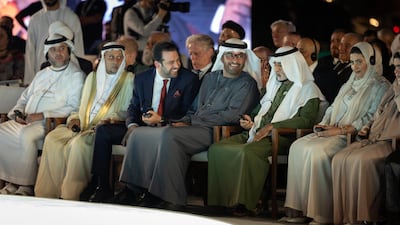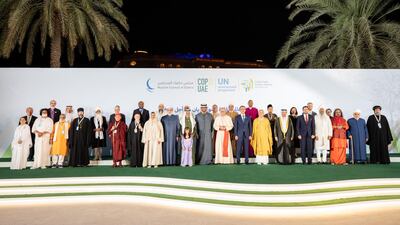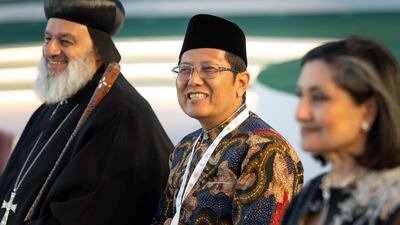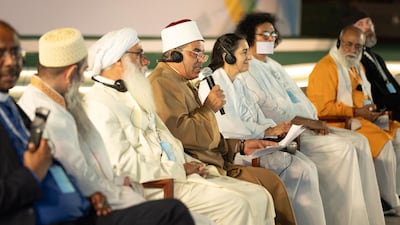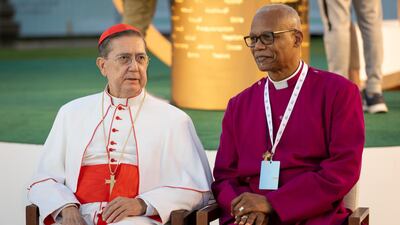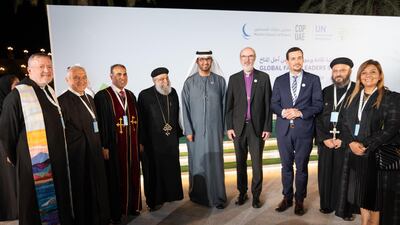Faith leaders from around the world have signed a statement in Abu Dhabi calling for global action on climate change and expressing concern for its escalating impact on the planet.
The Abu Dhabi Interfaith Statement for Cop28, signed by 28 faith leaders, “demands transformative action to keep 1.5°C within reach and serve affected and vulnerable communities”.
To halt the damaging effects of climate change, the world's average temperature should not exceed that of preindustrial times by more than 1.5°C, as enshrined in the Paris Agreement of 2015.
The signatories in Abu Dhabi acknowledged that as “representatives of diverse faith and indigenous traditions” they were meeting to express “shared concern for the escalating climate impacts that imperil our cherished planet, as well as our common commitment to jointly address the global crisis”.
Prof Mohamed Al Duwaini, deputy of Al Azhar Al Sharif, representing the Grand Imam of Al Azhar, and Cardinal Pietro Parolin, Vatican Secretary of State, representing Pope Francis, were among the signatories.
Dr Sultan Al Jaber, Cop28 President-designate and Minister of Industry and Advanced Technology, said the document sends a strong message ahead of Cop28 when thousands – including heads of state, government officials, industry leaders and climate experts – will come to the UAE to help deliver a vital blueprint for action to safeguard the planet.
“It is a powerful statement of intent that the entire world needs to hear. It was a statement of urgency, unity, solidarity, responsibility and hope,” Dr Al Jaber said in a statement.
He said faith leaders are a powerful voice for many communities.
“You [faith leaders] combine all faiths around a single message of our shared humanity,” he said.
"You are the custodians of the beliefs and aspirations of the vast majority of everyone living on the planet. Your collective faiths continue to inspire all people to live in harmony with nature and to act to protect our fragile world.
“You have brought together diverse faiths around a common goal and have shown that in a divided world, we can unite around climate action.”
The two-day global faith leaders' summit at Abu Dhabi Energy Centre, held under the patronage of President Sheikh Mohamed, was attended by Sheikh Nahyan bin Mubarak, Minister of Tolerance and Coexistence.
Prominent representatives from the world's major religions, accompanied by scholars and environmental experts gathered to deliberate on the ethical responsibility of faith leaders in addressing the climate crisis and the role they can play in mobilising their communities to protect the planet.
The summit came two days after a successful meeting in Abu Dhabi in which an agreement was reached by a special UN committee on the loss and damage fund, which aims to help countries – particularly those most vulnerable – deal with the irreversible damage from climate change.
“We are one step closer to delivering a fully operational fund. Parties came together in unity and solidarity to show multilateralism can still work for everyone, especially the most vulnerable,” Dr Al Jaber said.
He also called on faith leaders to help him send a message of tolerance, peace, optimism and prosperity from the UAE to the world.
Last month, Dr Al Jaber met Pope Francis in Rome to discuss the role faith communities can play in addressing climate change. The pontiff announced last week that he plans to travel to Dubai for the global summit.
Cop28 will be the first UN climate summit to host a pavilion dedicated to the engagement of faith communities.
The pavilion will also encourage intergenerational dialogue involving young faith leaders and indigenous representatives.
